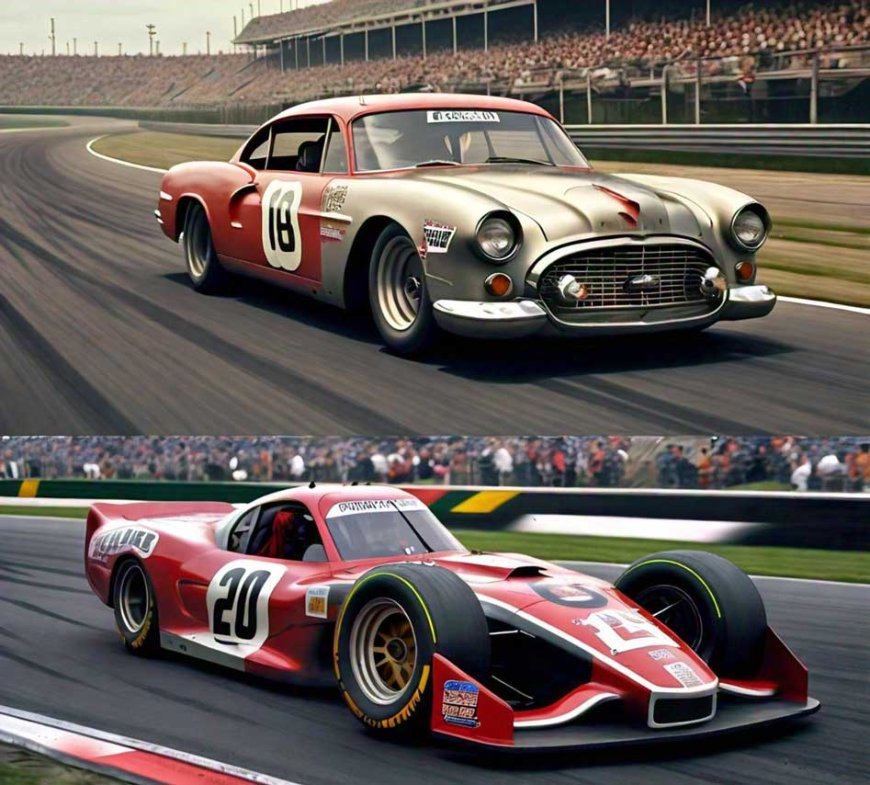The Evolution of Stock Car Racing: Then and Now
The Evolution of Stock Car Racing: Then and Now

Stock car racing has undergone a transformative journey since its inception in the 1940s. From its humble beginnings to the high-tech, high-speed sport we know today, NASCAR has experienced significant milestones and innovations. In this blog, we'll delve into the history of stock car racing, highlighting key developments and featuring insights from legendary driver Jeff Gordon.
Early Days (1940s-1960s)
Stock car racing originated in the Southern United States, where bootleggers modified their cars to outrun law enforcement. The first official NASCAR race took place on June 19, 1948, at Charlotte Speedway, with Jim Roper emerging victorious. Drivers like Lee Petty and Fireball Roberts became pioneers of the sport, competing in modified stock cars with minimal safety features.
Golden Era (1970s-1980s)
The 1970s and 1980s saw NASCAR's popularity soar, thanks to iconic drivers like Richard Petty, Dale Earnhardt, and Cale Yarborough. This period introduced:
- Aerodynamic improvements: Cars became more streamlined, reducing drag and increasing speed.
- Engine advancements: V8 engines replaced inline-6s, boosting horsepower.
- Safety features: Helmets, seatbelts, and protective barriers became mandatory.
Modern Era (1990s-2000s)
The 1990s and 2000s brought significant technological advancements:
- Fuel injection: Replaced carburetors, improving efficiency and performance.
- Advanced materials: Lightweight components, like carbon fiber, enhanced speed and safety.
- Computer-aided design: Teams utilized simulation software to optimize car design.
Jeff Gordon, a four-time NASCAR Cup Series champion, entered the scene during this period. "When I started racing in the 1990s, the sport was already evolving rapidly," Gordon recalls. "We saw significant improvements in engine power, aerodynamics, and safety features."
Contemporary Era (2010s-present)
Recent years have introduced:
- Gen-6 cars: Designed for better handling, safety, and fuel efficiency.
- Digital dashboards: Real-time data and telemetry enhance driver performance.
- Advanced tire technology: Improved grip and durability.
- Stage racing: Introduced in 2017, this format emphasizes strategic racing.
"Today's cars are incredibly sophisticated," Gordon notes. "The combination of advanced technology, improved safety features, and talented drivers has elevated the sport to new heights."
Technological Advancements
NASCAR has embraced innovative technologies to enhance performance, safety, and fan engagement:
- Engine fuel injection: Replaced carburetors, improving efficiency.
- Electronic Fuel Injection (EFI): Optimizes fuel flow and engine performance.
- Advanced materials: Lightweight components reduce weight and enhance safety.
- Wind tunnel testing: Teams refine aerodynamics using advanced simulation tools.
- Data analytics: Real-time data informs driver strategy and team decisions.
Safety Features
NASCAR has prioritized driver safety, introducing:
- HANS devices: Mandatory since 2003, these devices prevent head and neck injuries.
- Impact-absorbing walls: Soft walls reduce collision impact.
- Advanced helmets: Improved safety standards and materials.
- Seatbelt and harness systems: Enhanced restraint systems
- Jeff Gordon Dupont Jacket also look very safe
Jeff Gordon's Legacy
With 93 Cup Series wins and four championships, Jeff Gordon is one of NASCAR's most accomplished drivers. "I've witnessed tremendous growth and innovation in the sport," Gordon reflects. "From safety advancements to technological breakthroughs, NASCAR has become a premier form of motorsports."
The Future of Stock Car Racing
As NASCAR continues to evolve, expect:
- Electric and hybrid engines: Potential integration of alternative powertrains.
- Advanced aerodynamics: Continued innovation in car design and wind tunnel testing.
- Increased safety measures: Next-gen helmets, impact-absorbing walls, and more.
- Esports integration: Virtual racing and gaming will further engage fans.
Conclusion
Stock car racing's evolution is a testament to its resilience and adaptability. From humble beginnings to the high-tech sport we know today, NASCAR has experienced significant transformations. As the sport continues to innovate, Jeff Gordon's legacy serves as a reminder of its rich history and promising future.
What's Your Reaction?














![Noots Focus Reviews [Truth Exposed 2025]!](https://news.bangboxonline.com/uploads/images/202501/image_430x256_678e3b94881a1.jpg)
![Vivalis Male Enhancement: The Must-Know Ingredients [2025 Update]](https://news.bangboxonline.com/uploads/images/202501/image_430x256_678e3b54e396c.jpg)







